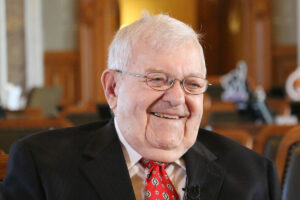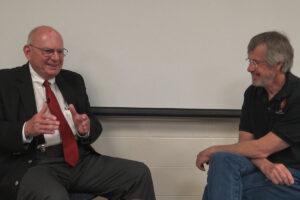Topic: Governor's leadership

Interview of August (Gus) Bogina, February 6, 2018
Interviewed by H. Edward (Ed) Flentje
In this 2018 oral history interview, former State Senator August (Gus) Bogina discusses his service in the Kansas Legislature, focusing on his 14 years in the Senate. Bogina reflects on his relationships with Senate leaders and governors during his 11 sessions as Chair of the Senate Ways and Means Committee. Bogina also describes his storied ride with the Highway Patrol when he was brought back from Johnson County following bypass surgery to cast the deciding vote on the water plan funding.
A version of this interview is also posted on KansasMemory.org, the website of the Kansas Historical Society.

Interview of H. Edward (Ed) Flentje, June 14, 2019
Interviewed by Rex Buchanan
In this 2019 oral history interview of Ed Flentje, he recalls the intricate work of developing a water planning process and applying good governance principles to a highly contentious issue that involved a variety of entities both inside and outside state government in the 1970s. The innovations in water regulation that grew out of the agenda of Governor Bennett, for whom Flentje served as Planing Director, were carried out and implemented by succeeding Governors, Carlin and Hayden. Flentje's description of water policy rising to prominence in the Bennett administration demonstrates how governors benefit from listening to a variety Show Moreof voices when developing policy agendas. Show Less

Interview of Joe Harkins, April 24, 2019
Interviewed by Rex Buchanan
In 2019 Joe Harkins sat down for an oral history interview conducted by Rex Buchanan. Harkins describes a career that began in public health and ranged from addressing nursing home problems in Kansas to initiating a graduate program in health administration. Persuaded to take on running the Kansas Water Office, Harkins engaged in transforming the culture of water administration at a time when issues related to water had a high priority in the state. In a detailed discussion of water policy, he discussed the dynamics of the relationship between governors and the legislature in developing, adopting, and funding Show Morea state water plan in the 1980s and early 1990s. Harkins brings the perspective of a professional public administrator to the issue of water policy development. He recalls learning about water policy while he was in charge of developing it. Harkins also has the perspective of a key staff member in several administrations in which water policy was a high priority. He reflects on the importance of gubernatorial leadership and the power dynamics among the various interests that shaped the ultimate policy. Harkins laments that water issues are no longer among the highest priorities in state public policy administration. This interview provides the most comprehensive explanations of policy development in practice in Kansas state government that is available.
Highlights -- short excerpts from the interview
